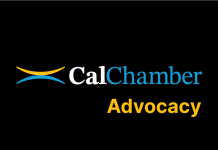SACRAMENTO, CA — The California Chamber of Commerce today released its annual Job Killer list, which includes 24 bills that would harm California’s economic growth and job creation should they become law.
“These bills represent some of the worst policy proposals affecting California employers and our economy currently being considered by the Legislature,” said CalChamber President Allan Zaremberg. “Some of these bills have been rejected time and again by the Legislature or vetoed by the previous Governor. Legislators should, instead, focus on removing impediments to economic growth and creating upward mobility for all Californians.”
In March, CalChamber identified AB 51 (Gonzalez; D- San Diego) and SB 1 (Atkins; D-San Diego) as job killer bills. They are included in the list below.
CalChamber will periodically release job killer watch updates as legislation changes. Reporters are encouraged to track the current status of the job killer bills on www.CalChamber.com/jobkillers.
The 2019 list of job killer bills follows:
AB 36 (Bloom; D-Santa Monica) Statewide Rolling Rent Control — Defies the will of the voters and worsens California’s housing shortage by modifying the Costa-Hawkins Rental Housing Act to allow cities to enact or expand rent control to residential properties constructed within 10 years of the date upon which the owner seeks to establish the initial or subsequent rental rate, which will discourage housing production, quality of housing, and impact low-income individuals and families.
AB 40 (Ting; D-San Francisco) Vehicle Ban — Discourages investment and eliminates jobs in California by essentially imposing a ban on all non-zero emission vehicles by requiring the California Air Resources Board to develop a strategy to ensure that all passenger and light-duty vehicle sales are zero emission by 2040.
AB 51 (Gonzalez; D-San Diego) Ban on Arbitration Agreements — Significantly expands employment litigation and increases costs for employers and employees by banning arbitration agreements made as a condition of employment, which is likely preempted under the Federal Arbitration Act and will only delay the resolution of claims. Banning such agreements benefits the trial attorneys, not the employer or employee. Governor Edmund G. Brown Jr. vetoed a similar measure last year and stated it “plainly violates federal law.”
AB 138 (Bloom; D-Santa Monica) Targeted Tax on Sweetened Beverages — Unfairly imposes a targeted excise tax on distributors of sweetened caloric beverages to fund health-related programs for all which will force distributors to reduce costs through higher prices to consumers or limit their workforce.
AB 288 (Cunningham; R-Templeton) Significant Expansion of Liability and Litigation for Consumer Data — Creates an onerous private right of action with a right to excessive punitive damages for purely economic losses at a low evidentiary standard, along with attorney’s fees, for a new consumer right to delete data that conflicts with the consumer right to delete recently provided by the California Consumer Privacy Act.
AB 495 (Muratsuchi; D-Torrance) Cosmetic Product Ban — Bypasses a legislatively-mandated analytical process to judge the safety of consumer products and seeks to prohibit safe cosmetic products based upon the mere presence of a chemical in the product, no matter the level, that will lead to potential regrettable substitutions and job losses in the cosmetic industry.
AB 628 (Bonta; D-Oakland) Uncapped New Leave of Absence for Employees and Their Family Members — Significantly expands the definition of sexual harassment under the Labor Code, which is different than the definition in the Government Code, leading to inconsistent implementation of anti-harassment policies, confusion, and litigation. Also, provides an unprecedented, uncapped leave of absence for victims of sexual harassment and their “family members” which is broadly defined, that will add another layer of burdens on employers and their ability to manage their workforce.
AB 673 (Carrillo; D-Los Angeles) Unfair Expansion of Penalties Against an Employer for Alleged Wage Violation — Unfairly exposes an employer to being penalized twice for the same violation, by allowing both an employee and the Labor Commissioner to recover the same civil penalties through civil litigation.
AB 725 (Wicks; D-Oakland) Inclusionary Housing Requirement — Will exacerbate California’s housing crisis by imposing a statewide, indirect inclusionary housing requirement that prohibits local jurisdictions from allocating more than 20% of their share of regional housing need for above moderate-income housing in areas zoned for single-family development.
AB 755 (Holden; D-Pasadena) Targeted Tax on Purchase of Tires — Imposes a $1.50 targeted tax on the purchase of new tires, that will unfairly raise prices on California residents, including employers, in order to fund the mitigation of zinc in storm water for all.
AB 790 (Levine; D-San Rafael) Increased Cost on Employers for Use of Personal Services Contracts — Discourages and reduces the use of “personal services contracts” as defined, by requiring the hiring entity to pay a minimum contractual compensation rate at 85% of the area median income, which will presumably include wages from different industries and occupations that are not comparable to personal services, and reduce jobs for individuals who perform the work under personal services contracts.
AB 857 (Chiu; D-San Francisco) Significant Risk to Taxpayer Dollars and Community Investment — Jeopardizes taxpayer dollars, community banks, and funding for small businesses that create jobs in local communities, by allowing the creation of local public banks which will impose significant costs and risks to taxpayer revenue for operations and capital, as well as unfairly compete with local community banks.
AB 882 (McCarty; D-Sacramento) Limitation on Ability to Maintain a Safe Workplace. Significantly undermines an employer’s ability to maintain a safe, drug-free workplace, by prohibiting an employer from discharging an employee who has tested positive for a drug that is being used for medical purposes, which will expose employers to costly litigation.
AB 1035 (Mayes; R-Yucca Valley) Expansion of Civil Litigation for Data Breaches — Unfairly requires businesses to notify consumers of a data breach within 72 hours, which will place an unrealistic compliance burden on businesses before they can reasonably assess the extent of the breach, thereby unnecessarily causing harm to consumers and increasing businesses’ class action exposure.
AB 1286 (Muratsuchi; D-Torrance) Unfair Contractual Mandates on Use of Motorized Scooters. Significantly increases costs and litigation on shared mobility providers by prohibiting arbitration agreements as a part of the consumer contract, which is preempted under the Federal Arbitration Act and will create uncertainty and delay for the resolution of disputes.
AB 1332 (Bonta; D-Oakland) Contract Prohibition for Businesses that Provide Services to Federal Government — Prohibits California public entities from contracting with, or investing in, any business that provides data-related services to an undefined group of federal agencies. Will create litigation and uncertainty for businesses that continue to work with California public entities, as the bill provides no clear guidance on how to comply with terms, and also in limited circumstances, compels public entities to breach signed contracts.
AB 1468 (McCarty; D-Sacramento/Gallagher; R-Yuba City) Targeted Tax on Opioids — Unfairly imposes an excise tax on opioid distributors in California, which will increase their costs and force them to adopt measures that include reducing workforce and increasing drug prices for ill patients who need these medications the most, in order to fund drug prevention and rehabilitation programs that will benefit all of California.
SB 1 (Atkins; D-San Diego) Unprecedented Delegation of Legislative Authority and Increased Litigation — Creates significant uncertainty and litigation risks to regulated entities by giving certain state agencies unfettered authority to adopt rules and regulations without any of the Administrative Procedure Act safeguards when the agency, in its discretion, determines that the federal rules and regulations in effect on January 19, 2017 are more “stringent” than existing federal law. It also increases the potential for costly litigation by creating private rights of action under California law or when a state agency takes the foregoing discretionary action.
SB 44 (Skinner; D-Berkeley) Targeted Mandate that Will Increase Transportation Costs — Severely impacts transportation costs by directing CARB to develop a strategy to reduce all motor vehicle emissions by 40% by 2030 and 80% by 2050 by disproportionally targeting diesel medium- and heavy-duty trucks. Threatens jobs by requiring an immediate strategy for reduction of diesel vehicles without sufficient alternate technology.
SB 135 (Jackson; D-Santa Barbara) Substantial Expansion of California Family Rights Act — Significantly harms small employers in California with as few as 5 employees by requiring these employers to provide 12 weeks of a protected leave of absence each year, in addition to existing leaves of absences already required, as well as potentially requiring larger employers to provide 10 months of protected leave, with the exposure to costly litigation for any alleged violation.
SB 246 (Wieckowski; D-Fremont) Targeted Tax on Oil and Gas Operators — Unfairly targets one industry by imposing a 10% oil and gas severance tax onto an oil and gas operator, adding another layer of taxes onto this industry that will significantly increase the costs of doing business, thereby increasing prices paid by consumers for goods and services in this expensive state as well.
SB 468 (Jackson; D-Santa Barbara) $20 Billion Tax Increase — Repeals several of California’s most popular and most important tax exemptions and expenditures, which would raise taxes by $20 billion.
SB 561 (Jackson; D-Santa Barbara) Significant Expansion of Liability and Litigation Under California Consumer Privacy Act (CCPA) of 2018 — Creates an onerous and costly private right of action that will primarily benefit trial lawyers to sue for any violations of the CCPA and removes businesses’ 30-day right to cure an alleged violation of the CCPA as well as businesses’ ability to seek guidance from the Attorney General on how to comply with this confusing and complex law.
SB 567 (Caballero; D-Salinas) Expands Costly Presumption of Injury — Significantly increases workers’ compensation costs for public and private hospitals by presuming certain diseases and injuries are caused by the workplace and establishes an extremely concerning precedent for expanding presumptions into the private sector.
Cumulative Job Killer Vetoes
2018: 29 Job Killers identified, 1 sent to Governor Edmund G. Brown Jr., 1 vetoed;
2017: 27 Job Killers identified, 3 sent to Governor Brown, 2 signed, 1 vetoed;
2016: 24 Job Killers identified, 5 sent to Governor Brown, 4 signed, and 1 vetoed;
2015: 19 Job Killer bills identified, 3 sent to Governor Brown, 1 signed, and 2 vetoed;
2014: 27 Job Killer bills identified, 2 sent to Governor Brown, 2 signed;
2013: 38 Job Killer bills identified, 1 sent to Governor Brown, 1 signed;
2012: 32 Job Killer bills identified, 6 sent to Governor Brown, 4 signed, 2 vetoed;
2011: 30 Job Killer bills identified, 5 sent to Governor Brown, 1 signed, 4 vetoed;
2010: 43 Job Killer bills identified, 12 sent to Governor Arnold Schwarzenegger, 2 signed, 10 vetoed;
2009: 33 Job Killer bills identified, 6 sent to Governor Schwarzenegger, 6 vetoed;
2008: 39 Job Killer bills identified, 10 sent to Governor Schwarzenegger, 1 signed, 9 vetoed;
2007: 30 Job Killer bills identified, 12 sent to Governor Schwarzenegger, 12 vetoed;
2006: 40 Job Killer bills identified, 11 sent to Governor Schwarzenegger, 2 signed, 9 vetoed;
2005: 45 Job Killer bills identified, 8 sent to Governor Schwarzenegger, 1 signed, 7 vetoed;
2004: 23 Job Killer bills identified, 10 sent to Governor Schwarzenegger, 10 vetoed;
2003: 53 Job Killer bills identified, 13 sent to Governor Gray Davis, 11 signed, 2 vetoed;
2002: 35 Job Killer bills identified, 17 sent to Governor Davis, 12 signed, 5 vetoed
2001: 12 Job Killer bills identified, 5 sent to Governor Davis, 3 signed, 2 vetoed;
2000: No Job Killers identified. Of 4 bad bills identified at end of session, Governor Davis signs 2 and vetoes 2.
1999: 30 Job Killer bills identified, 9 sent to Governor Davis, 6 signed, 3 vetoed;
1998: 64 Job Killer bills identified, 11 sent to Governor Pete Wilson, 11 vetoed.
1997: 57 Job Killer bills identified, 9 sent to Governor Wilson, 9 vetoed.
The California Chamber of Commerce (CalChamber) is the largest broad-based business advocate to government in California. Membership represents one-quarter of the private sector jobs in California and includes firms of all sizes and companies from every industry within the state. Leveraging our front-line knowledge of laws and regulations, we provide products and services to help businesses comply with both federal and state law. CalChamber, a not-for-profit organization with roots dating to 1890, promotes international trade and investment in order to stimulate California’s economy and create jobs. Please visit our website at www.calchamber.com
#####


